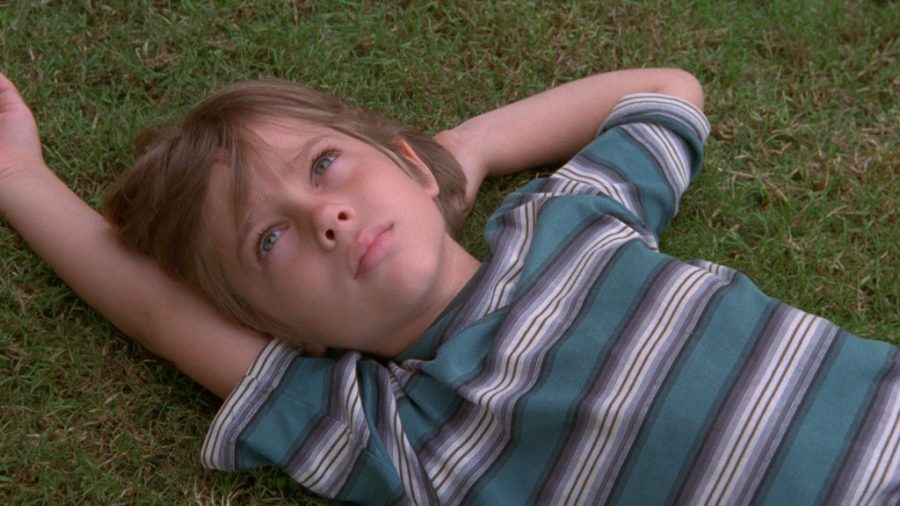
 It’s a truism in Hollywood that you can’t make a movie with a passive protagonist. Movies thrive on the illusion that we can all take charge of the situations we find ourselves in and act to change them in meaningful ways in 120 minutes. But no matter how capable we are, on a large enough timeline, we are all subject to huge, implacable forces beyond our control, never more so than in childhood, and this fated passivity has never been more accurately portrayed than in Richard Linklater’s latest film Boyhood. This is not to say that Mason (Ellar Coltrane), the protagonist simply sits around while life passes him by, far from it. We see him play, laugh, fight, learn, lash out, fall in love, and more. But the film’s incredible scope lets us see these actions from an almost cosmic perspective, where actions can be seen as re-actions, attempts by Mason to assert himself and find happiness in a shifting, slippery world.
It’s a truism in Hollywood that you can’t make a movie with a passive protagonist. Movies thrive on the illusion that we can all take charge of the situations we find ourselves in and act to change them in meaningful ways in 120 minutes. But no matter how capable we are, on a large enough timeline, we are all subject to huge, implacable forces beyond our control, never more so than in childhood, and this fated passivity has never been more accurately portrayed than in Richard Linklater’s latest film Boyhood. This is not to say that Mason (Ellar Coltrane), the protagonist simply sits around while life passes him by, far from it. We see him play, laugh, fight, learn, lash out, fall in love, and more. But the film’s incredible scope lets us see these actions from an almost cosmic perspective, where actions can be seen as re-actions, attempts by Mason to assert himself and find happiness in a shifting, slippery world.
Before going any further, the specifics: Linklater began to make this film in 2002, taking then six-year-old Coltrane, and filming him over the course of 12 years, along with Linklater’s daughter Lorelei as Mason’s sister Sam, Ethan Hawke as Mason Sr. and Patricia Arquette as Mason’s mother Olivia. The result is a rich tapestry of an American childhood that attempts to capture the myriad pressures and influences that a child must make sense of and grow through.
Many of the biggest changes are in family structure. Mason’s parents are already separated at the film’s beginning, with Mason Sr. having just returned from sowing some wild oats in Alaska. Olivia sees him as an irresponsible dreamer and while he clearly wasn’t ready for fatherhood when it was first thrust upon him, he eventually settles into the role with a new family and remains a supportive presence for Mason Jr. and Sam. Meanwhile, Olivia does the best she can on her own, going back to school to better provide and eventually becoming a well-liked professor. Along the way she picks up two more husbands, who seem at first to better fit the father role that Mason Sr. fled from, but reveal their own flaws in time.
Through it all, Mason listens, learns, and adapts. He has no choice. It is pure cinematic joy to see him gradually transform. He begins as a wide-eyed, slightly dreamy child, seeing glimpses of an adult world he neither fully understands nor has any power over. He ends as a college freshman, a budding artist who is kind and decent, striding with confidence into the future. Linklater’s particular genius in this project is the balance he strikes. We see Mason Jr. in moments both big and small, mundane and life changing, the distinction not always clear until later. While Mason’s story is being intimately told in the foreground, the macroscopic story of America’s last decade unfolds in the background. The dialogue shows changing attitudes towards politics and religion, along with evolving music, movies, and games, all refracted through Mason’s consciousness and experiences.
There are a few points of comparison to this project: the 7Up documentary series, Truffaut’s Antoine Doinel films, and Linklater’s own Before series. But none of these larger series come close to the effect of this single film, which portrays like never before the relentless river of time. Boyhood’s striking formal innovation allows it to take an ordinary, emblematic family and make them transcendent, creating a movie miracle that deserves the widest audience possible.